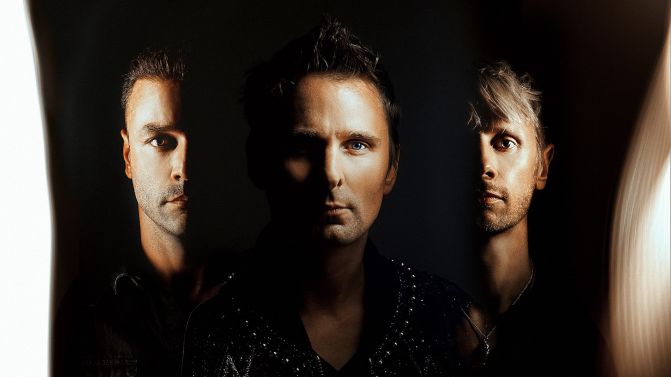When Muse’s mad wizard Matt Bellamy boldly declared to the BBC back in February that “the guitar is no longer a lead instrument” many longtime fans started to fret about what direction the band might take on new album, Simulation Theory. After 24 years of crafting some of the most genuinely progressive rock the world had to offer, had the preposterously talented English trio finally run out of things that they could do with the guitar?
When the band followed up that bold declaration with the genre-hopping, trap-beat driven single ‘Thought Contagion’ and the synth-heavy pop anthem ‘Something Human’ (with a stunning 80’s sci-fi film clip), it became apparent that in true Muse fashion, Simulation Theory was going to be a sonic adventure. Released on Friday, Simulation Theory is exactly that. A dizzying mish-mash of seemingly clashing musical styles, guitars included, that somehow manage to meld together into a bonkers yet cohesive listen.
On the eve of the release of Simulation Theory, bassist Chris Wolstenholme had a chat to Music Feeds about the creative process, the positive and negative sides of our dependent relationship with technology and whether or not we are all living in a simulation.
MF: Your eighth record Simulation Theory is about to drop, this deep into your career, do you still get a rush as release dates approach?
CW: It’s quite an interesting time really. I think the strangest thing for us is that some of these songs have been around for quite a while. There’s normally a kind of strange period of time between finishing the album to having to wait three, four, five months before people actually get to hear it. It’s a little different this time, with the way that we’ve recorded and the fact that we were actually releasing some of the songs when they were recorded, rather than waiting to deliver the whole album in one go. A lot of people have already heard quite a lot of songs from the album already.
We’ve talked a lot about how people listen to music and how there seems to be a lot more importance placed on songs now, rather than albums. We felt that rather than do the album all in one go, it’d be fun to try and kind of feed little bits of it to people before releasing the whole thing. So, it feels a little bit different this time because so much has already been heard. But it’s still exciting and I think there’s still six or seven songs that people haven’t heard. So, it will be very interesting to hear what people think on Friday.
MF: Simulation Theory is yet another sonic journey for listeners, injecting several new elements into your already bombastic prog rock blend. The result of which to my ears is a futuristic dystopian soundscape. Is that something you were consciously hoping to deliver?
CW: I’m not entirely sure. People have said that it recalls the ’80s and that that’s been quite a strong influence, and I guess it has to some degree.
I think because Drones was probably the most retrospective album we’ve ever done. I think when we started making that album, we thought about maybe going back a little bit to earlier years and stripping away a lot of the external influences from outside of being a guitar band. So, we ended up with an album that was very much just a sort of straight ahead rock guitar record. We didn’t really want to do that again.
We felt like it was a good time to just really go drastically different and try some new things. I think there’s always a danger when you get to seven, eight, nine albums of just becoming a retread, but you have to constantly try new things. There’s no point in doing the same thing over and over and over again. I think as musicians, I think we would probably get bored if we did that. I think we always like to learn about new things and listen to different types of music and take influences from new places. I think that’s something that we really enjoy doing. It’s always fun to step outside of the comfort zone, and sometimes put the guitars down, and try to figure out other ways of making great sounds.
MF: The decision to co-produce with a team of producers from across a range of genres was a bold one, but it appears to have paid dividends, the record still sounds cohesive.
CW: I think it’s been quite an experiment. I think each song individually has been a good experiment because, like I said, we’ve recorded it all very, very separately. Most albums we’ve made we’ve kind of made over a three or four month period of time and this album was made over nearly two years. I think ‘Something Human’ was the first thing we recorded, and that was way back in November 2016. So, it was great because we weren’t really thinking too much about the album and we weren’t thinking about how do all the songs fit together. We were just working very creatively on individual songs, and being very experimental and trying new ideas, and trying not to put ourselves in any sort of box really.
MF: The title Simulation Theory conjures images of science-fiction films and tripped out college party debates with philosophy majors, is it intended to be a concept record?
CW: I think it depends on how you look at it. I mean, in my opinion I don’t think it’s as much of a concept record as Drones was. I think Drones was, both sonically and lyrically, was quite conceptual. I think the album told a story. I always sort of compare everything to the lyrics of Drones. It’s like reading a short book. You’ve got a very definite start, middle, and end, I don’t think Simulation Theory is conceptual in that way.
I mean, I think there are some things that Matt keeps going back to. ‘Something Human’ I think being one that’s probably an overriding theme throughout the album. t’s almost sort of this anti Drones, sort of coming away from the technology and trying to break out of the system, or whatever it is, and be earning for ‘Something Human’ again, or something a bit more real. I think that’s a good reflection of society at the moment, how we spend so much of our lives just not really in reality, a hell of a lot of screen time these days.
The way that people communicate these days is usually through some sort of technology. Interestingly, just watching my own kids and the way that they communicate with each other is very, very different to how I used to communicate with my kids- with my friends, which was actual direct real communication. I think you almost feel like you get to this point with technology, where it’s taken over so much, that maybe we’re all starting to actually think, “Well how good is all this technology? How good is this simulated world that we’ve invented for ourselves?” because we’re actually getting to the point now where we don’t want to have conversations with people. We’d rather be on Instagram or Snapchat!
MF: It’s so true. I work at a university as my ‘day job’ and the new generation of kids that have come through recently have been fascinating to learn how to deal with because pretty much none of them want to actually SPEAK to each other.
CW: They don’t talk to each other! They don’t talk to anyone! I mean, I speak to my kids about this and I can remember when I was 16, 17, I spent a lot of time on the telephone too. I used to talk to my friends a lot and if I was bored I would phone one of my friends. So I get the appeal, but I asked one of my kids the other day “Why don’t you actually call somebody? Why don’t you have a conversation?” He was a bit like, “Why would you do that?, I’ve got Snapchat. I don’t need a telephone!”
MF: Yeah. Phone calls are for emergencies only. They’re so inconvenient!
What are we even doing right now man? What is this ancient technology the two of us are using right now?
CW: Exactly, yeah (laughing).
MF: The videos from the record are certainly supporting that notion so far with their 80’s sci-fi concepts. Is the visual aspect something you consider during the writing process? It all flows so well!
CW: I think this time it really did have some influence. Usually the music is first and foremost in our minds, we go in and make an album, then when the albums finished, all the sudden its like, “Oh, shit. We need an album cover. Shit. We need a video.” There’s this kind of last-minute panic as to like, what can we do from the visual side of things? I think this time, again because of the way it was recorded and because it was recorded over such a long period of time, I think it just gave us a little more time to really think about those visual references and what we wanted.
Once we started to hear this kind of ’80s thing that was happening in the music, then I think it just automatically took us back to childhood a little bit, and all the great films that we watched when we’re in our younger years. Back to the Future and Blade Runner and all that stuff. Just all these great, sort of, 1980’s sci-fi films. And we just thought that that was a really great visual thing that we could use for this record, and something that we could perhaps use throughout the record so that the videos and the album cover all kind of tie in together nicely.
MF: Despite your genuine rock superstardom, Muse have always remained quite playful and part of your playground has always been the live show, which has grown into something truly otherworldly as the years have gone by, is there new tweaks we can expect to see on the Simulation Theory tour?
CW: I actually think on this next tour we talked a little bit about coming away from that a little bit, tying in with the theme of the album, and maybe not relying so heavily on the technology, for the show because I think that’s something that we’ve pushed and pushed and pushed with each tour. I just feel like with the Drones tour, we went so far with the technology, that it would almost be hard to create a show that is spectacular as Drones was. So, the idea for us this time was that, perhaps, we would go for a more human element to the show and have a lot of performance involved.
MF: I couldn’t help but notice that the World Tour is noticeably missing Australia, did we mysteriously fall off of the world, or is there plans to venture down under soon?
CW: I’m sure we will. Australia is one of my favourite places on earth so I will definitely be pushing to be playing in Australia. Absolutely.
MF: You’re an incredibly inventive and versatile bassist, at times it seems like you’re playing lead bass or another instrument altogether. How have you managed to see past the implied limitation of the bass?
CW: I think there’s a few reasons really. A lot of it is down to the way that Matt plays guitar.
He’s very melodic in the way that he plays and very expressive. He’s never been the kind of guitar player to just sort of chug away on power chords. So I’ve always found that, even going back to the really, really early days, there was always this kind of huge space in the music that I just kind of felt was my place to fill, because Matt was doing his thing and there just seemed to be this kind of void! So I’ve always tried to sort of fill what I was sonically- expand it with a lot of different sounds. Matt writes in a way that is more suited to an orchestral interaction between guitar and bass and that’s developed into what it is over the years.
I’ve always like melodic bass players. I think because I started as a guitar player. So, when I went to the bass, I didn’t really differentiate that much. I mean, obviously I knew that being a bass player it meant that there was a much more of an emphasis on the precision of the timing and all that kind of stuff, but I just I didn’t really see the restrictions of the bass because I played guitar for so long. I just always kind of figured, “Well you play notes on the guitar and you can play notes on a bass. Then if you can play a nice melody on the guitar then why shouldn’t you be able to play a nice melody on a bass as well”!
MF: In 2018, genre specification is seemingly a dead or at least dying concept, which is fascinating as a listener and no doubt exciting as a band, is there elements of any other genres you’d still like to branch out into and incorporate?
CW: I’m sure there is, I mean I think we feel like we’ve explored a lot, but there’s a whole host of music out there. That’s why I like Spotify so much, you can just listen to all of the stuff that you would never have dreamed of listening to twenty years ago. I think it’s really, really opened people up to listening to different types of music because I think people were so selective over the CDs that they bought because they were expensive.
So people seem to have a much more- they sort of had an alliance to a specific genre because it’s something they were familiar with. It’s something they knew they liked. So you didn’t want to waste your money. You always stuck to something you knew you liked. You wouldn’t take any risks from buying a CD. That’s all kind of gone away now because of Spotify. I think it’s great because there’s a whole lot of music that I’ve listened to that I probably would have never listened to. I think it’s good for music in general because I think that people’s influences in music aren’t just come in from what they hear on the radio anymore. They’re coming from the entire history of music which is available on your phone any time of day. It’s great (laughing).
MF: So what you’re saying is we’ve found ourselves back to a point where technology is good again?
CW: Yes, I suppose we have!
MF: Before we let you go, answer me this, are we living in a simulation?
CW: To some degree, yes (laughing), but THEY don’t want you to know that.
—
Muse’s new album ‘Simulation Theory’ is out now!












